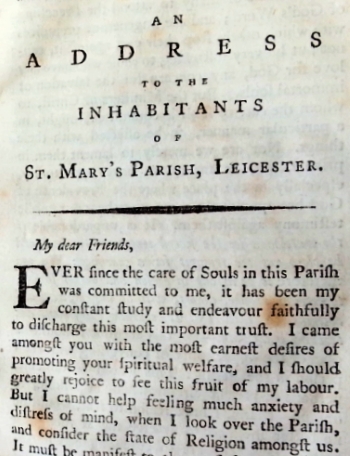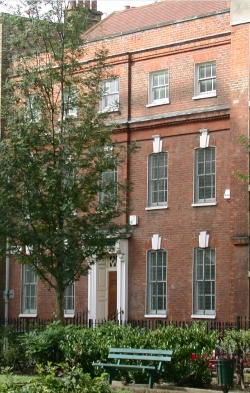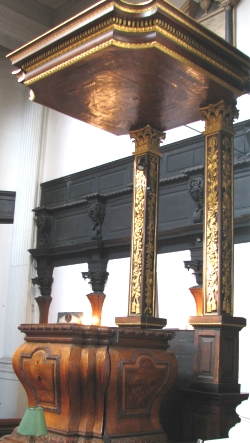John Newton to Thomas Robinson
My Dear Sir
I hope Mr Moore will breakfast with us tomorrow, for as yet I have only seen him at church. I prepare a line to send by him. Thank you for two addresses to Leicester (one of which is imperfect—half-a-sheet wanting and half-a-sheet duplicate), and I purpose sending with this four copies of my first address in St. Mary Woolnoth,[1] for you will perceive it deserves not the name of a sermon. Please to send one of them to Dr Melton;[2] and tell him, if he has the gout in his right hand, I hope he will be better soon, that I may have a letter.
Thomas Robinsons' Address to the Inhabitants of St Mary's Parish, Leicester, 1780
|
 |
I left Olney, January 14th. It was hard work when it came to the point. Mrs Newton followed me the 2nd February, and our goods came up the 23rd March, since which time we have been in a habitation of our own;[3] so that the old connection is quite terminated, and the business of removal, which appeared so formidable in prospect, is completed. We take up our work and burdens in large parcels, and load cur spirits with the whole at once, but the Lord mercifully divides them, so much for every day; and could we confine the thoughts of the day to the things of the day, we should skip on more pleasantly than we sometimes do. I sometimes flatter myself with a hope, that I have now but one more remove to make; yet I check myself; why should I care whether I am here or there, provided I am in the Lord's service and have the Lord's presence? Shall a worm—a compound of sin and dust—dare, or even wish, to choose for itself? The earth is the Lord's; and if He be with me, what matters it whether I live by the Thames, or the Ganges, or the Ohio? whether I be fixed to one spot like a cabbage, or whether I traverse the sea and the dry land? Home with Him is everywhere. Such thoughts are pretty enough upon paper, but are not so easily realised and reduced to practice when the occasions offer; at least, I fear, not by me. My soul cleaves to the dust; I love ease and convenience; and though there is that in me which aims to say, “Not my will but Thine be done,” there is something within me likewise which mutters very different language. But whither have I rambled?
|
 |
I meant to tell you that we have a very tolerable house in Charles-square, Hoxton —an airy situation, within sight of trees and cows[pix Hackney RO?]. Compared with London it is a sort of Olney, but compared with Olney it is a London. I am a full mile, or near a mile-and-a-half, from my church, which, so far as exercise is wanted, may be an advantage; but I suppose Mr Self will not over admire it, in very bad weather, or in dark winter nights. But nihil est ab omni parti beatum.[4] I think, through the whole history of my chequered life since I knew the Lord, though I have been not without trials, yet the pleasing has been more predominant than the painful. And thus my present house and the whole of my new situation, though not without ifs and buts, is in the main agreeable.
Charles Square - the 18th century house next door to Newton's (since demolished) |
Though my attachment to Olney was very strong, and my inclination wedded both to the place and the people, I never felt a moment's hesitation or regret for accepting Mary Woolnoth. Many things concurred before and at the time, to show me that the hand and will of the Lord was in it, and many things have happened since to confirm me in the persuasion. I feel the loss of woods and fields and birds and rural walks and scenes, but these are not means of grace; the Lord only could support me in my late retired post, and He is able to support me in more public life. I can have but a few years more to spend upon earth; since the Lord has brought me hither, I am now willing to hope, that as my sphere of service is now much more extensive, He will make me more useful.
|
|
One mercy is, that I find myself perfectly at home in Mary Woolnoth pulpit, and am helped to speak as plainly to the great folks as I formerly did to the little ones. I believe too many of the principal people are disgusted and keep aloof; some, however, attend; and, considering the greatness of the change they have met, and the short time they have been used to it, we get on as smoothly as could be well expected[v]. The congregation on Sunday is larger; and I expect it will be much larger, if I prefer myself to be Sunday Evening Lecturer, as I believe I shall when the days are long enough to preach without candles. I have already a lecture on Wednesday morning, when I am pretty well attended for a young beginner.[6] As Mr Romaine [pix] preaches on Tuesday morning and Mr Foster [pix] on Thursday, and people cannot be always hearing sermons, it must be some time before I can expect a great number. We are, however, a sort of medley, as I am known to be rather of a peaceful turn, and not very dogmatical about less essential matters; some of all parties, Church and Dissenters, Whitfieldites, Wesleys, Moravian, sit very quietly together. |

Newton's pulpit
St Mary Woolnoth |
But enough of myself and Mary Woolnoth. I now make a transition to Mary Leicester, and my good friends in that quarter. I propose to give your address (that which is complete) to Lord Dartmouth when I see him; I think it is a pity that the modesty of his vicar should preclude him from a sight of it I would confirm to him what I have told him more than once, that I believe, in procuring the living for you, he very essentially served the cause of the Gospel. I trust the Lord will sanctify the afflictions in your family, and enable you and Mrs Robinson to praise Him, whether He gives, spares, or takes away. Our love to all our kind friends. I have no prospect of visiting them soon, yet hope for that pleasure in good time, if our lives are spared. When I get a little to rights and to settle my papers, I expect to find letters from the Mr Ludlams which I have not yet answered, and hope to find time to write to them both: but my connections are now so diversified and extended, that I am afraid from henceforth I shall be but a poor correspondent; but in the course of the year I hope to send abroad some letters from the press, and all my good friends may consider them as addressed to themselves.
You have probably heard of a strange sort of book in favour of Polygamy, which has been some time in the press,[7] and I fear will soon be published. All the remonstrances to the author to suppress it seem but as straw and stubble and rotten wood. I fear it will give much offence and do much harm. How many things do we see and hear which should engage us to pray with David, “Hold Thou me up and I shall be safe!”[8] The Lord forbid we should presume or depend upon gifts, abilities, or past zeal or past services. If these things could have kept my poor friend, he would have stood firm, and not have been left to so gross an infatuation as has seized him. Ah! we live in an enemy's land, we tread upon enchanted ground, and breathe an infected air; and without the supporting power of God and the preservatives of the Gospel, we should faint and fall. My dear's health is variable, but she has not been so ill as to be confined; at present she is pretty well. We believe you will continue to love us and to pray for us. With love to you and Mrs Robinson, Miss Boys, and all friends,
|
|
|
I remain most sincerely and affectionately yours, |
|
Charles-square, Hoxton, April 3, 1780 |
John Newton |
|
|
|
|
|
* The Evangelical Register, 1839; page 140, No. 27 |
|
Endnotes:
|
[1] |
The Subject and Temper of the Gospel Ministry, qv (No. 10, Dec 1779) |
|
[2] |
Dr Thomas Ford of Melton Mowbray, qv (14 May 1779) |
|
[3] |
13 Charles Square, Hoxton (the numbering changed over the years when this house was demolished, it was No. 17. For a description, photos and interior sketches see Survey of London, ed Sir James Bird, Philip Norman, 1922, vol 8, Shoreditch, pp147-8, Plates 65, 66, 80 [https://ia700406.us.archive.org/6/items/surveyoflondon08londuoft/surveyoflondon08londuoft.pdf]) |
|
[4] |
nihil est ab omni parti beatum: nothing is blessed forever. [Horace, Ode 2, Bk 16 Otium (Peace)] |
|
[5] |
Some “little difficulty” excepted: “"A churchwarden came to me yesterday in the vestry extremely civil, and gave me to understand he spoke in the name of the principal parishioners, who were very respectable, and disposed to be very obliging. They believed I would do anything in my power to oblige them. Then followed the Complaint - that some of them found their pews possessed by strangers before they came to church and others, though their seats were vacant, could not get to them for the crowd in the middle aisle. I answered that the latter inconvenience was unavoidable, if the church doors stood open; the former I was very sorry for, but knew not how it was in my power to remedy it. He purposed with many apologies, my letting another clergyman preach now and then for me, hinted that it should be no expense to me and thought that if it was uncertain whether I preached or no, the people would not throng the church so much. I could not but admire the scheme. I thought it would exactly answer the design. But I said I could not possibly comply with it. If he pleased I would speak to the people from the desk. He wished I would - therefore I shall and add a word to the parishioners to dispose them to be good humoured to the strangers. Some little difficulty upon this head must be expected, but I hope it will subside by degrees." Newton to his wife, 22 January 1780, LPL |
|
[6] |
The following year Newton’s nephew, Benjamin Nind (1773-1867), was enrolled at the Bluecoat School (Christ’s Hospital) in London. Every Wednesday morning his mother, Newton’s sister Thomasina, would fetch him, bringing ‘a nice dinner’ with her, and they would slip into the crowded pews at St Mary Woolnoth to hear Uncle John preaching. |
|
[7] |
Cowper’s cousin, Martin Madan(1725-1790), chaplain at the Lock Hospital, published, to the great consternation of his evangelical friends, Thelyphthora; or, A Treatise on female ruin, 2 vols, 1780. He proposed that ‘Every man who has seduced a woman, whether with or without a promise of marriage, should be obliged to wed her publicly’ (regardless of whether or not he was already married). When persuasion failed to dissuade him from publishing, the Countess of Huntingdon offered to buy up all the books, but he went ahead and published. The outcry against the book caused his resignation from the chaplaincy at the Lock. |
|
[8] |
Psalm 119:117 Hold thou me up, and I shall be safe: and I will have respect unto thy statutes continually. |
|
Marylynn Rouse, 23/06/2015
|
|